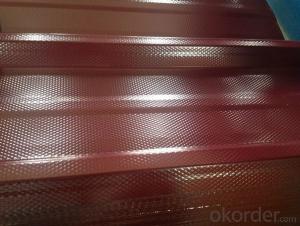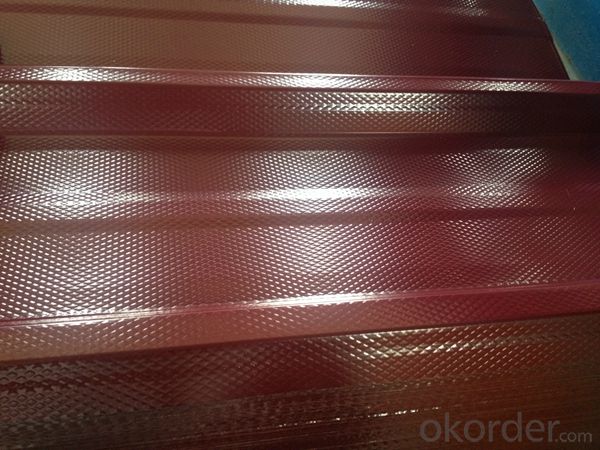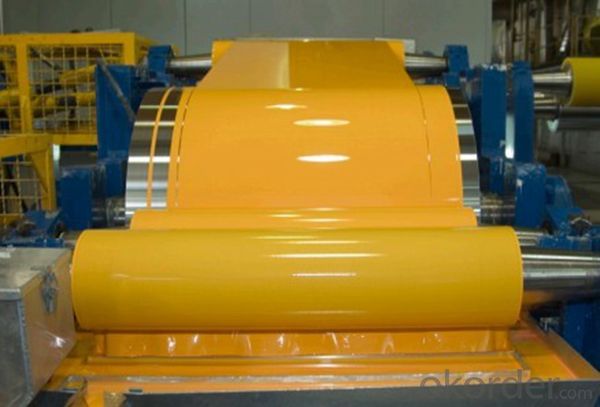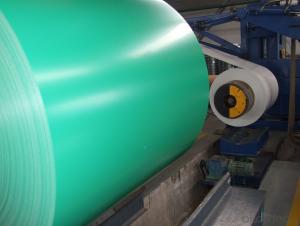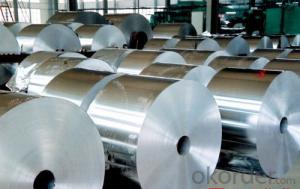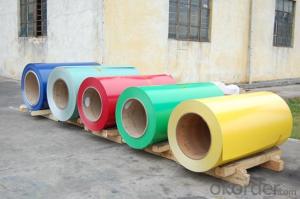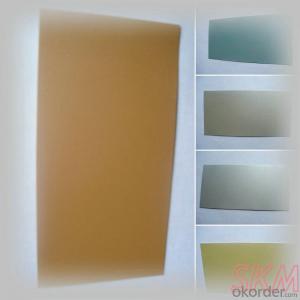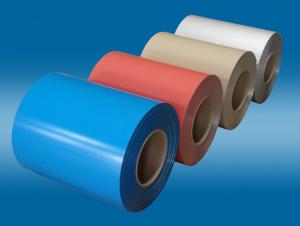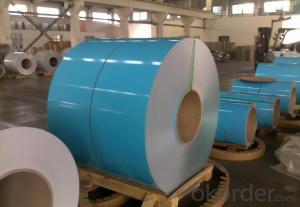Aluminum Coil Coating - Pre-Painted Colored Aluminum Coil in Roll for ACP Panel
- Loading Port:
- Shanghai
- Payment Terms:
- TT OR LC
- Min Order Qty:
- 5 m.t.
- Supply Capability:
- 10000 m.t./month
OKorder Service Pledge
OKorder Financial Service
You Might Also Like
Specification
1. Specification of Pre-painted Colored Aluminum Coil in Roll for ACP Panel
characteristics | Application |
1) Super peeling strength | 1) Building exterior curtain walls |
2) Excellent surface flatness and smoothness | 2) Decoration and renovation additions for old buildings |
3) Superior weather, corrosion, pollutant resistance | 3) Decoration of interior walls, ceilings, bathrooms, kitchens and balconies |
4) Even coating, various colors | 4) Shop door decorations |
5) Fireproof, excellent heat and sound insulation | 5) Advertisement board display platforms and signboards |
6) Superior impact resistance | 6) Wallboards and ceilings for tunnels |
7) Lightweight and easy to process | 7) Industrial materials, materials for vehicles and boats |
2. Application of Pre-painted Colored Aluminum Coil in Roll for ACP Panel
(1).Interior: wall cladding, ceilings, bathrooms, kitchens and balconies, shutters, doors...
(2).Exterior: wall cladding, facades, roofing, canopies, tunnels,column covers , renovations...
(3).Advertisement: display platforms, signboards, fascia, shop fronts...
3. Feature of Pre-painted Colored Aluminum Coil in Roll for ACP Panel
*Such coil is specially designed to replace aluminum ingot, due to the high export tax of aluminum ingot, the coil has better price than ingot.
*This type of coil can fit customer's remelting furnace just like ingot, no need to make any change to the production line that was previously used for ingot. The standard coil size and weight is very suitable for the feed gate of furnace.
*This type of coil causes less material wastage than ingot when remelted.
*Our coil is made directly from ore, no need to go though the ingot making process, quality is much better than other suppliers who use ingot scrap to make coil.
Be free from Oil Stain, Dent, Inclusion, Scratches, Stain, Oxide Dicoloration, Breaks, Corrosion, Roll Marks, Dirt Streaks and other defect which will interfere with use
4. Certificate:
SGS and ROHS(if client request, paid by client), MTC(plant provided), Certificate of Origin(FORM A, FORM E, CO), Bureau Veritas and SGS (if client request, paid by client), CIQS certificate
5. Image of Pre-painted Colored Aluminum Coil in Roll for ACP Panel
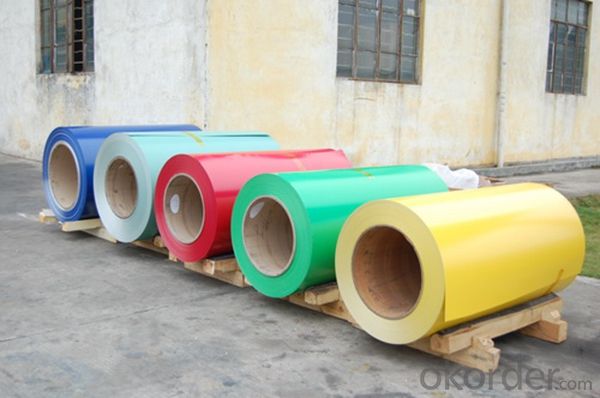
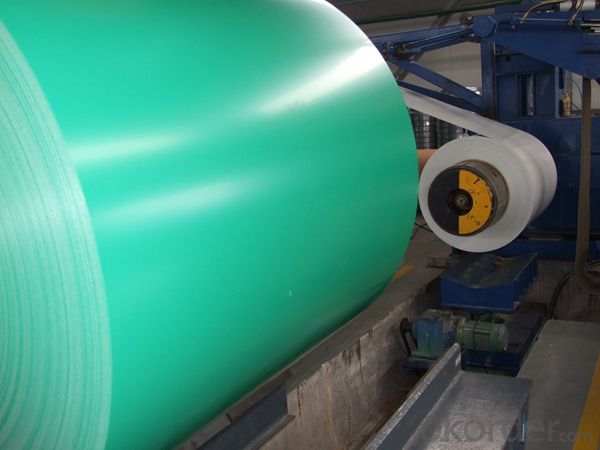
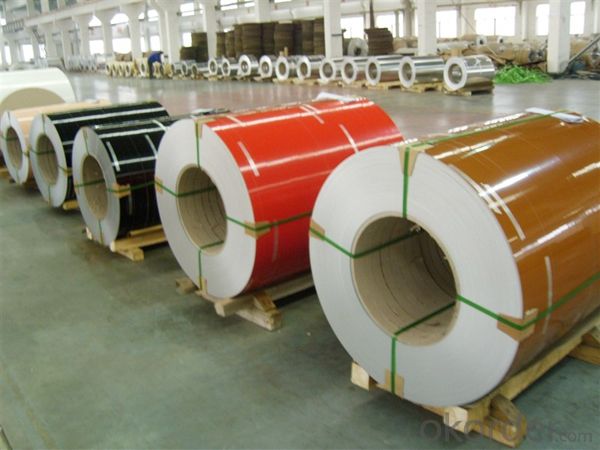
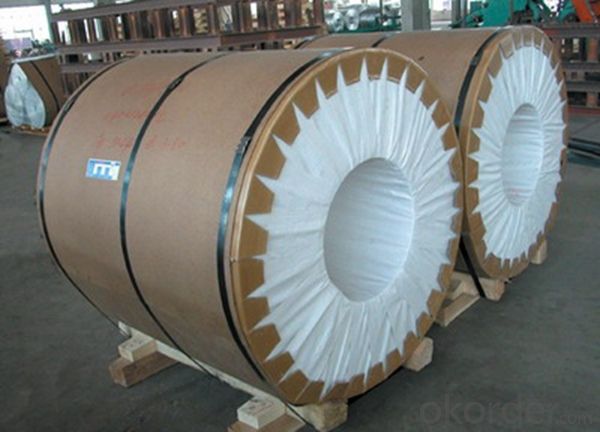
6. Package and shipping of Pre-painted Colored Aluminum Coil in Roll for ACP Panel
eye to wall
eye to the wall
with wood pallet (wooded case also available)
7. FAQ
1) What is the delivery time?
Dpends on actual order, around 20 to 35 days
2)What is the QC system:
We have QC staff of 20 persons and advanced equipment, each production is with MTC traced from Aluminum ingot lot.
3) What market do you mainly sell to?
Australia, America, Asia, Middle East, Western Europe, Africa etc
- Q: Can aluminum coils be used in the production of heat shields?
- Heat shields can indeed be made using aluminum coils. Aluminum is a preferred option for heat shields because of its exceptional thermal conductivity, lightweight characteristics, and ability to reflect radiant heat effectively. Typically, heat shields are designed to safeguard delicate components or structures from excessive heat generated by engines, exhaust systems, or other sources. By shaping and sizing aluminum coils, one can create efficient heat shields that disperse heat and prevent its transfer to surrounding areas. Furthermore, aluminum exhibits corrosion resistance, making it suitable for applications where heat shields may encounter harsh environments or chemicals. All in all, aluminum coils are an appropriate material choice for producing heat shields due to their thermal properties, adaptability, and long-lasting nature.
- Q: Are there any health or safety concerns related to aluminum coils?
- Aluminum coils can pose some health and safety concerns, especially in certain circumstances. One potential concern is the release of aluminum particles or fumes into the air, particularly during the manufacturing or processing of aluminum coils. Inhalation of these particles or fumes can potentially lead to respiratory issues or lung damage. Additionally, aluminum coils that are damaged or corroded may release aluminum ions into food or beverages, which can be harmful if ingested in excessive amounts. However, it is important to note that the risks associated with aluminum coils are generally minimal and can be mitigated through proper handling and maintenance. For instance, manufacturers typically employ various safety measures to prevent the release of aluminum particles or fumes during production. Furthermore, aluminum coils used in heating, ventilation, and air conditioning systems are typically coated or treated to prevent corrosion and the subsequent leaching of aluminum ions. To minimize any potential health risks, it is recommended to follow safety guidelines provided by manufacturers, such as wearing appropriate protective gear during handling, and ensuring proper ventilation in areas where aluminum coils are processed or installed. Additionally, regular inspection, cleaning, and maintenance of aluminum coils can help identify and address any potential issues before they become a health or safety concern. In conclusion, while there are some health and safety concerns related to aluminum coils, these risks can be managed through proper handling, maintenance, and adherence to safety guidelines. It is always advisable to consult with professionals or manufacturers for specific instructions and recommendations related to the utilization and maintenance of aluminum coils in order to ensure maximum safety.
- Q: This question asks for the current prices of aluminum coil in various regions around the world.
- <p>The price of aluminum coil can vary significantly based on factors such as market demand, supply, transportation costs, and regional economic conditions. Prices are typically quoted per metric ton and are influenced by the London Metal Exchange (LME) and regional metal exchanges. For the most accurate and up-to-date prices, it's best to consult with local metal suppliers or check online commodity trading platforms. Prices can change daily, so real-time data is essential for making informed decisions.</p>
- Q: Can aluminum coils be used in extreme weather conditions?
- Yes, aluminum coils can be used in extreme weather conditions. Aluminum is a highly durable and corrosion-resistant material that can withstand harsh weather conditions such as extreme heat, cold, humidity, and even heavy rain or snow. It is frequently used in applications where weather resistance is crucial, such as in air conditioning systems, refrigeration units, and outdoor equipment. Aluminum coils are designed to be strong and reliable, making them suitable for use in extreme weather conditions without compromising their performance or longevity.
- Q: Can aluminum coils be used in the aerospace industry?
- Indeed, the aerospace industry finds great utility in aluminum coils. The extensive use of aluminum in this sector is attributed to its advantageous characteristics, including its low density, impressive strength-to-weight ratio, and exceptional resistance to corrosion. The manufacturing of numerous aircraft elements, such as fuselage panels, wings, and structural frameworks, often relies on the employment of aluminum coils. These coils can be effortlessly molded into various shapes and sizes, allowing for design flexibility and a reduction in overall aircraft weight. Moreover, aluminum coils seamlessly integrate with diverse manufacturing techniques like welding, machining, and forming, rendering them a prime selection for the aerospace industry.
- Q: Are there any specific safety guidelines for installing aluminum coils?
- Yes, there are specific safety guidelines for installing aluminum coils. It is important to follow manufacturer instructions and guidelines, wear appropriate personal protective equipment (PPE), and ensure proper handling and storage of the coils. Additionally, one should be cautious of sharp edges and edges of the coils to prevent injuries during installation.
- Q: The user is asking if it's possible to recycle old aluminum coils to create new ones.
- <p>Yes, you can recycle old aluminum coils into new ones. Recycling aluminum is a highly efficient process, and it's very common in the industry. Aluminum has one of the highest recycling rates among metals due to its value and the energy savings associated with recycling compared to producing new aluminum from raw materials. When you recycle aluminum, it can be melted down and reformed into new coils or other products without losing its properties. This process helps conserve resources and reduces environmental impact.</p>
- Q: What are the different available coil weights for aluminum coils?
- The weight of aluminum coils available can vary depending on factors such as thickness, width, and alloy. Typically, coil weights for aluminum range from a few hundred pounds to several thousand pounds. Thinner gauge coils generally weigh between 1,000 and 5,000 pounds, while thicker gauge coils can weigh up to 20,000 pounds or more. The range of specific weights also relies on the manufacturer or supplier's capabilities and specifications. To determine the exact range of available coil weights for desired aluminum coils, it is advisable to consult with the manufacturer or supplier.
- Q: Is it possible to use aluminum coils in the creation of toys or games for children?
- <p>Yes, aluminum coils can be used to make toys or games for children, but safety considerations must be taken into account. Aluminum is a lightweight, durable, and non-toxic material, making it suitable for various applications, including children's toys. However, it's crucial to ensure that any aluminum used in toys is properly treated to prevent sharp edges or small parts that could pose a choking hazard. Additionally, the toys or games should be designed and manufactured to meet safety standards and regulations to protect children from potential harm.</p>
- Q: And if the deodorant companies know that aluminum causes cancer, why do they keep putting it in their products?
- Antiperspirant. okorder /
Send your message to us
Aluminum Coil Coating - Pre-Painted Colored Aluminum Coil in Roll for ACP Panel
- Loading Port:
- Shanghai
- Payment Terms:
- TT OR LC
- Min Order Qty:
- 5 m.t.
- Supply Capability:
- 10000 m.t./month
OKorder Service Pledge
OKorder Financial Service
Similar products
Hot products
Hot Searches
Related keywords
